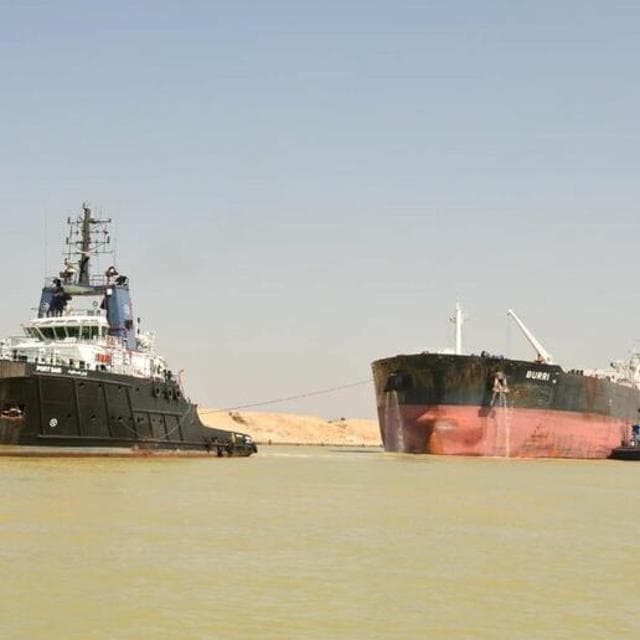Gasoline and food, because the Suez crisis is putting a strain on Italian families’ wallets
by Eugenio Occorsio
Business

Instability around the Suez Canal is worrying financial markets, just after a week in which U.S. inflation was above expectations, reducing bets on an impending Fed rate cut.
David Rees, Senior Emerging Markets Economist at Schroders, noted in a recent note how the Houthi attacks and the situation in the region have begun to strain global supply chains. Problems that add to recent woes at the Panama Canal, where “a combination of drought caused by climate change and changes in rainfall due to El Niño have caused water levels to decline.”
by Eugenio Occorsio

This brings back memories of the global problems triggered by the Covid-19 pandemic and the associated impact on inflation. But for the expert, there are three “important differences” to the situation back then, for which “it is unlikely that the problems in the Red Sea will lead to a significant increase in inflation.” Firstly, demand conditions are currently significantly weaker.” The result is that global growth is slowing. The second element noted is that, unlike Covid, demand for goods and services has rebalanced while global production is in recession. Third, there are no production stops typical of lockdowns: “Detours via southern Africa extend delivery times, but goods will still reach their destination, suggesting that real bottlenecks are unlikely,” writes Rees.
Of course, trade routes have a significant impact. According to a study by ISPI, the Drewry Composite Index for Containers (World Container Index) rose 61% in the first week of this year, reaching $2,670 for 40-foot containers, the sector’s main size unit. The increase is 25% compared to the same week last year and 88% compared to pre-pandemic average rates in 2019. But for Rees, a more immediate risk is the transmission of inflation “if tensions in the Middle East begin to escalate.” “Influence the supply of raw materials, especially by increasing energy prices.” The forecast is that “an increase in tensions in the region could lead to rising prices.” oil towards $120 a barrel,” a fall that would lead the global economy into stagflation. There has been an upswing for the time being, but the analyst sees it as satisfactory and limited with a Brent price of around $80.
Outside the Middle East, markets are also waiting for signals from central banks on the timing of monetary easing. The most anticipated event is January 31, when the Fed’s Steering Committee could give its opinion and previews in this regard, while this week the Davos Forum begins, which will be attended by ECB President Christine Lagarde. In the US, we’re waiting for December retail sales to be released on Wednesday, an important litmus test for holiday shopping. The forecast is +4%, compared to expected +4.1%. On the macroeconomic front, important data will also arrive from China with the publication of the fourth quarter GDP on the same day. The trend is expected to weaken, confirming that Chinese growth is currently struggling to regain strength. In the euro zone, German GDP data for the full year 2023 will be published on Monday, which is likely to confirm a technical recession in the fourth quarter. Following Lau’s victory in the presidential election, there will be further special surveillance in Taiwan in the next few days. What is worrying is that his independence supporters could increase tensions with China.
Domestically, the dossier on the former Ilva remains hot, while December inflation data is due to be published on Tuesday. Another highly anticipated event is the speech by the new Governor of the Bank of Italy, Fabio Panetta, to the ABI Steering Committee, scheduled for Wednesday in Milan.
Here are the key events reported on the agendaact:
MONDAY, JANUARY 15TH
– Rome: Istat publishes data on foreign trade and import prices for November.
– Rome: Press conference to present the financing lines for occupational safety measures of the ISI 2023 – Inail Agriculture tender.
– Rome: Publication of the “Statistics” file series on the results of the survey on inflation and growth expectations for the fourth quarter of 2023 on the Bank of Italy website.
TUESDAY, JANUARY 16TH
– Rome: Istat publishes consumer price data for December.
– Rome: Istat press conference to present the new data on consumer prices, “Inflation 2023: a reading of the indices, the inheritance for 2024 and the impact on family spending brackets”.
– Rome: Presentation of the XI. Report “The balance sheet of the Italian social security system. Financial and demographic trends in pensions and support for 2022”, edited by Prof. Alberto Brambilla.
– Milan: opening press conference. The speakers will be Alberto Nagel, CEO of Mediobanca Francesco Saverio Vinci, General Manager and Head of Wealth Management Mediobanca Gian Luca Sichel, CEO of CheBanca! Lorenzo Bassani, General Manager CheBanca! WEDNESDAY, JANUARY 17TH
– Milan: Abi Executive Committee. Fabio Panetta, Governor of the Bank of Italy, takes part.
THURSDAY, JANUARY 18TH
– Rome: CES conference with CGIL, CISL, UIL, the Minister of Labor and Social Policy, Maria Elvira Calderone and European bodies.
FRIDAY, JANUARY 19TH
– Rome: Istat publishes data on construction production in November.
SATURDAY, JANUARY 13TH
– Florence: Ceremony for awarding the Golden Guilder to Abi President Antonio Patuelli.